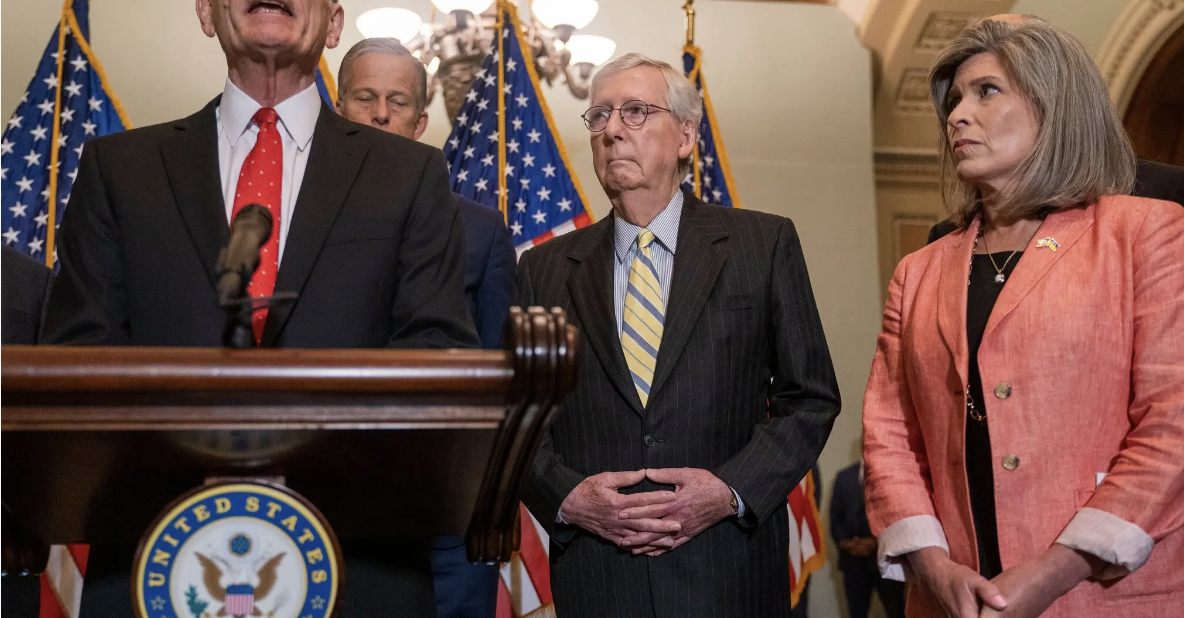Senate Approves Bipartisan Gun Safety Bill
The 65-33 vote included 15 Republicans in favor and came less than 12 hours after the Supreme Court ruled 6 to 3 to strike down New York’s gun law, likely limiting the ability of state and local governments to restrict guns outside the home.
The Senate approved bipartisan legislation on Thursday aimed at keeping firearms out of the hands of dangerous people, after a small group of Republicans joined Democrats to break through their party’s longstanding blockade of gun safety measures and shatter nearly three decades of congressional paralysis on toughening the nation’s gun laws.
Spurred to action by a mass shooting that killed 19 children and two teachers at an elementary school in Uvalde, Texas, the Senate passed the measure 65 to 33, with 15 Republicans, including Senator Mitch McConnell of Kentucky, the minority leader, breaking ranks to side with Democrats in support of the measure. Two Republican senators were absent.
It would enhance background checks for prospective gun buyers ages 18 to 21, requiring for the first time that juvenile records, including mental health records beginning at age 16, be vetted for potentially disqualifying material. The bill would provide incentives for states to pass “red flag” laws that allow guns to be temporarily confiscated from people deemed by a judge to be too dangerous to possess them. And it would tighten a federal ban on domestic abusers buying firearms, and strengthen laws against straw purchasing and trafficking of guns.
It also includes hundreds of millions of dollars in funding for mental health programs and to beef up security in schools.
“This is not a cure-all for all the ways gun violence affects our nation, but it is a long overdue step in the right direction,” Senator Chuck Schumer of New York, the majority leader, said on the Senate floor. “It’s significant — it’s going to save lives.”
Speaker Nancy Pelosi of California has said the House will move quickly to clear the measure, and White House officials have said President Biden would sign it, calling the bill “one of the most significant steps Congress has taken to reduce gun violence in decades.”
The bipartisan breakthrough came on the same day that the Supreme Court struck down a New York law that placed strict limits on carrying guns outside the home, reflecting a stark divergence between the conservative-leaning court and the Democratic-controlled Congress on one of the most politically intractable issues in the country.
The vote tally also underscored how deeply polarizing the issue remains, and how fleeting the spirit of compromise around guns may be. Most Republicans opposed the bill, and most of those backing it will not face voters this year, suggesting that the measure was less an opening for a new era of bipartisan consensus on gun violence than a rare moment of agreement that may soon give way to more gridlock, particularly if Republicans win control of Congress this fall.
Still, a small group of Democrats and Republicans seized on the outrage that followed the massacre in Uvalde almost exactly one month ago and a racist mass shooting in Buffalo days before that to forge a modest compromise that could succeed where earlier attempts had repeatedly failed.
Mr. McConnell praised Democrats for being “willing to give up their wish list” and accept less than they have insisted on in past efforts at revamping gun laws.
He also conceded that he and other Republicans saw a clear political advantage in supporting the legislation in a midterm election year in which their path to winning control of Congress runs through the suburbs, where their party’s hard-right lurch has alienated many voters.
“It’s no secret that we’ve lost ground in suburban areas,” Mr. McConnell told reporters on Thursday night. “I hope it will be viewed favorably by voters in the suburbs we need to regain to be in the majority next year.”
The compromise, the product of an intense round of talks between a small group of Democrats and Republicans, omits many of the sweeping gun control measures that Democrats and activists have long called for.
Toiling to keep Republicans on board, Democrats left out their marquee gun control proposals, including a House-passed measure that would prohibit the sale of semiautomatic rifles to people younger than 21, a ban on the sale of high-capacity magazines and a federal red flag law. They also agreed that the enhanced background checks for younger buyers would expire after a decade, just as the assault weapons ban did in 2004, leaving future Congresses to haggle anew about whether to extend it.
But it included substantial breakthroughs beyond what Democrats had initially thought possible when they set out to find a modest deal that could, at the very least, show that Congress was capable of responding to national crisis.
“I’ve never seen families and kids and parents as scared as they were after Uvalde,” Senator Christopher S. Murphy of Connecticut, the lead Democratic negotiator, said on Thursday. They were scared for their children’s safety, he said, “but they were also scared that their government was so fundamentally broken that it couldn’t step up and address the one thing that matters most to anybody in this country — the safety of our kids.”
Mr. Murphy said that while the legislation fell short of everything Democrats would like to pass, it provided “an answer that allows us to tell families all across this country that the era of inaction is over.”
The bill would set aside $750 million in federal grant funding to help states implement red flag laws and for other crisis intervention programs, including mental health courts.
In another change long sought by activists against domestic violence, it would include serious current or recent dating partners in a federal law that bars domestic abusers from being able to purchase a firearm, closing what has become known as the boyfriend loophole. The ban currently applies only to people who have been married to, have been living with or have a child with a victim.
The legislation would set aside millions of dollars, largely in grants, to address mental health in schools and communities, including $150 million for the national suicide hotline. It also would provide $300 million for school safety programs, including bolstering security and funding school resource officers.
Besides Mr. McConnell, the Republican support came from centrists, longtime veterans of previous failed negotiations, and notably, lawmakers just a couple of years into their latest term. Just two of the 15 Republicans, Senators Lisa Murkowski of Alaska and Todd Young of Indiana, are facing voters in November, and four are retiring.
In trying to make their case to Republicans, Mr. McConnell and Senator John Cornyn of Texas, his handpicked emissary to the talks, conducted a poll of 1,000 gun-owning households across the country and found that most supported the key elements. A solid majority backed increasing federal funding for states to maintain or implement red flag laws, and more than 80 percent supported closing the boyfriend loophole and allowing law enforcement to have more time to examine juvenile and mental health records.
That was not enough for most Senate Republicans, however, who argued that the measure would infringe upon the rights of gun owners.
“I’m angry that these horrific crimes keep happening, but I’m also angry that this august chamber plays political games,” said Senator Ted Cruz, Republican of Texas, who teamed with Senator John Barrasso of Wyoming, the No. 3 Republican, in an unsuccessful effort to strip out the gun-related measures and divert federal funds to mental health and school safety programs.
“Do something that will stop these crimes — this bill ain’t that, but it does have provisions that are troubling,” Mr. Cruz added. “It does have provisions that satisfy the Democrat political priority to go after the Second Amendment right to keep and bear arms of law-abiding citizens.”
Mr. Cruz was echoing some of the criticism that the National Rifle Association heaped on the bill. The group said the legislation “does little to truly address violent crime while opening the door to unnecessary burdens on the exercise of Second Amendment freedom by law-abiding gun owners.”
Democratic proponents said the legislation’s approval was possible only because the senators involved in the talks put aside their parties’ orthodoxies to find a deal.
“Our bipartisan group of senators rejected the notion that legislating must be a zero-sum game with winners on one tally sheet and losers on the other,” said Senator Kyrsten Sinema of Arizona, a key Democratic negotiator who took on the role of conduit to the Republican side during the negotiations.
That meant Democrats had to tailor the bill’s provisions to appeal to Republicans. For instance, they accepted a G.O.P. demand that closing the boyfriend loophole would not be implemented retroactively and that dating partners who commit a single misdemeanor offense can regain the ability to purchase a gun after five years if their records remain clean.
“The potential we have to save lives is worth any sort of concession we might have had to make during the negotiation,” Mr. Cornyn said in a speech on Thursday night, in which he thanked his colleagues for ignoring “those who would spew disinformation and outright lies” about the measure. Afterward, several Democrats went up to Mr. Cornyn, who was heckled at a Republican gathering in Texas last week for last week for participating in the talks, to offer thanks and shake his hand.
Democrats were hoping that the majority of Republicans who opposed the bill would look out of step with voters in the coming midterm elections. A recent Quinnipiac poll showed that 59 percent of Republicans and 76 percent of independents favored raising the minimum legal age to buy any gun to 21. And the vast majority, including Republican voters, supported at least some gun control measures, including enhanced background checks.





